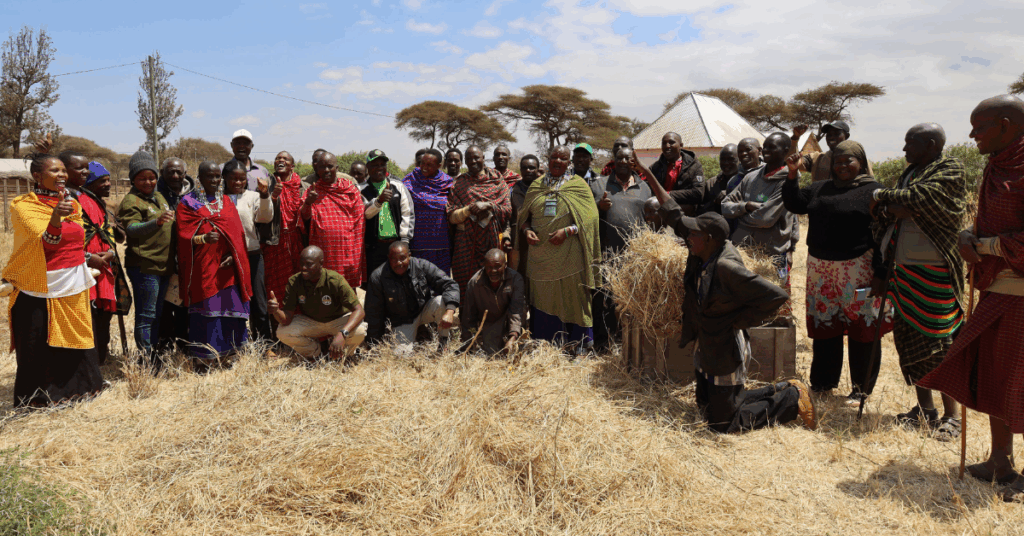
CABI’s Landscapes Initiative has reported significant progress across Eastern Africa as communities, governments and partners advance efforts to restore degraded ecosystems, improve rangeland productivity and manage invasive species. To achieve this, the Initiative is using an Integrated Landscape Management (ILM) approach, promoting inclusiveness, participation and co-creation.
The update, covering activities since April 2025, highlights new partnerships, community-driven restoration initiatives and strong political support across Kenya, Tanzania and Ethiopia.
Native PEP project expands restoration efforts
Phase 2 of the Native Plants for Environment and People (Native PEP) project, launched earlier this year, is strengthening community-led restoration using native plant species in areas affected by the invasive tree Prosopis juliflora and land degradation.
Recent activities include stakeholder meetings in Baringo and Isiolo counties in Kenya to align county policy with restoration priorities, and field visits to monitor progress on Prosopis clearance, fodder production trials, and rejuvenated natural springs.
Engagements with Baringo County Executives and Members of the County Assembly have resulted in commitments to support Prosopis control, including interest in drafting a county bill to guide long-term management.
Communities lead Prosopis control in Tanzania
In Tanzania’s Lake Natron basin, communities continue to implement an area-wide plan for Prosopis juliflora management developed through a Darwin Initiative-funded project. The plan has been adopted by district and regional authorities and integrated into annual budgets.
Households in Wosi Wosi have collectively contributed labour and livestock resources to clear Prosopis-infested areas, while the Pinyinyi community has adopted early detection and rapid response measures after witnessing severe invasion impacts in neighbouring districts.
Biocontrol work underway in Laikipia
CABI is supporting Naibunga Conservancy in Laikipia County, Kenya, to address the spread of Opuntia engelmannii, an invasive cactus that has reduced grazing land and accelerated soil erosion. With support from The Nature Conservancy, mass-rearing facilities for a highly specific cochineal biocontrol agent were established in 2024 and are now operational.
The agent is expected to weaken or kill the cactus over time, providing a sustainable alternative to manual removal.
Stakeholders chart future ILM priorities in Baringo
A multi-stakeholder workshop held in Marigat, Baringo County, from 30 September to 1 October brought together more than 50 representatives from local communities, conservancies, county departments, NGOs and national institutions.
Participants identified key environmental challenges and explored collaborative pathways for Integrated Landscape Management (ILM). Insights from the workshop will support the development of new ILM concept notes for the county.
CABI supports IFAD mission in Ethiopia
CABI contributed technical expertise in ILM during the International Fund for Agricultural Development (IFAD) Partial Supervision Mission for the Participatory Agriculture and Climate Transformation (PACT) programme in Ethiopia in June.
The mission reviewed progress on watershed management, soil and water conservation, agroforestry and participatory governance. CABI also submitted a concept note for potential future involvement in the programme.
Strong funding pipeline despite global challenges
Despite a challenging funding environment, the Landscapes Initiative has submitted several competitive and non-competitive proposals with partners, including to WWF USA, the Legacy Landscapes Fund, IGAD, the World Bank, Horizon Europe and the Global Centre on Biodiversity for Climate.
One concept under GCBC has progressed to full proposal stage, aiming to support native plant restoration and climate resilience in Kenya’s semi-arid lands. CABI has also been invited to submit a concept note to the Oak Foundation, with a full proposal to be prepared in early 2026.
Formalizing the partnership with NETFUND
CABI and the National Environment Trust Fund (NETFUND) formalised their existing partnership through a Memorandum of Understanding signed during the CABI Member Countries Review Conference in Nairobi. The collaboration will support joint design and implementation of projects focused on ecosystem restoration and Nature-based Solutions in Kenya.
Looking ahead
CABI says the progress reflects growing momentum behind community-centred restoration and landscape management in Eastern Africa.
“Despite the difficult global funding climate, we continue to see strong commitment from communities, governments and partners,” said Dr Hariet Hinz, Global Director, Invasive Species at CABI. “We look forward to further expanding these efforts in 2026.”
You can see the update on the CABI Landscape Initiative here.
Additional information
Main image: Native Plants for Environment and People (Native PEP) hay baling Tanzania (Credit: Xavery Dickson, TAFORI)
Relevant stories
Related News & Blogs
Workshop in Malawi explores benefits of Integrated Landscape Management
CABI scientists facilitated a two-and-a-half-day workshop with key stakeholders in Malawi to explore an Integrated Landscape Management (ILM) to improve ecosystem goods and services for the benefit of people and the environment. Twenty-one participants…
17 September 2024

